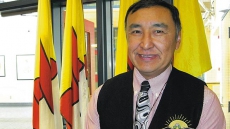OTTAWA — Even before a horde of political reporters agreed to be locked up by the government all day Tuesday in order to peruse the federal budget, a whirlwind of news was conspiring to overshadow the Liberals' first economic blueprint.
Two deadly bombs had just exploded in Brussels. Then Rob Ford died.
The next day, as MPs of all political stripes were gearing up to do battle over the government's newly charted fiscal course, Alberta Conservative Jim Hillyer died suddenly, forcing the house to adjourn early and stifle debate.
And then came Ghomeshi.
So yes, the federal budget has escaped the scrutiny of many Canadians, for the moment. Its legacy will be significant, if stealthy —even if it wasn't in the limelight this week.
Here's how:
1. THE YOUNG. Starting in July, families with children will see some government cheques disappear, including the universal child care benefit and extra relief for low-income families. Instead, a single monthly payment: the Canada child benefit.
Income-tested and tax free, it's billed by the Liberals as simpler and more generous for low- and middle-income families.

Smoke and mirrors, argue the Conservatives, who remind Canadians that they've also lost income splitting — a particular boon to families with a stay-at-home parent — and popular boutique tax credits for kids active in organized sports or arts programs.
Which families will be better off under the new system? It's difficult to say — wealthy families, definitely not; low-income households, probably.
The government's online benefits calculator (web address?) will be a popular place for a while. Do the math: the Liberal child benefit is worth about $5 billion more annually than all the previous Conservative measures put together. That's money in the pockets of parents.
2. THE ELDERLY. As advertised, the budget formalizes the Liberal promise to bring the age of eligibility for old age security and the guaranteed income supplement back to 65, after the Conservatives extended it to 67. Plus, some 900,000 single people earning less than $4,600 a year will be getting higher GIS payments.
The budget also kicks off a comprehensive rethink of retirement security: the government is launching discussions with the provinces to bolster the Canada Pension Plan. The goal is a flexible system that allows ready, willing and able participants to work after the age of 65 without financial penalty — or without penalizing those who can't keep working.

The Liberals also want to remove bad luck as a factor in retirement. For now, they argue, there's a role for government in helping those whose retirement savings are subject to the whims of the financial markets on the day they withdraw or repurpose their money. They say they want to mitigate that risk and make sure savings are secure and sufficient.
First, all or most of the provinces need to agree. Premiums will likely have to go up to pay for such enhancements, too — prompting a political fight about whether the changes are truly worth it.
3. THE SICK. Missing from the budget was the election commitment to "immediately" begin spending on home care, to the tune of $3 billion over four years. The government said it just isn't ready — not to mention that health care negotiations with the provinces are still ongoing.
Improvements to compassionate care leave were also prominent in the election platform, but didn't make the cut in the budget — despite a raft of changes to the employment insurance system.
Assisted dying is becoming a viable option for suffering Canadians who are nearing the end of their lives. A federal bill will need to be introduced very soon in order to meet the Supreme Court's June deadline, which has already been extended four months.

In the interim, a number of terminally ill patients have availed themselves of the Supreme Court ruling in February that granted the extension. It also gave permission to anyone in search of a doctor-assisted death to go before a judge to request one.
The public has also made it clear to the government that it wants access to decent and improved palliative care alongside the right to an assisted suicide. That has the government negotiating and looking for funding as a once-outlawed practice comes into its own in Canada.




